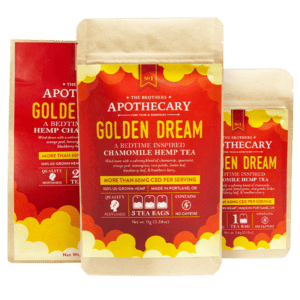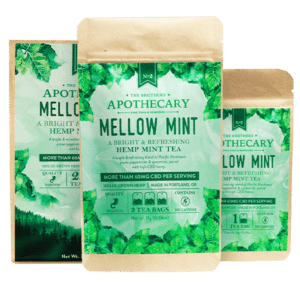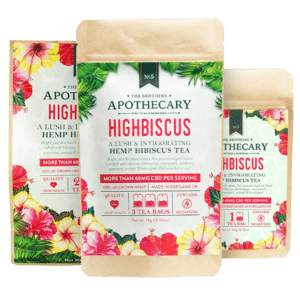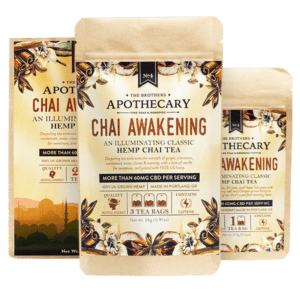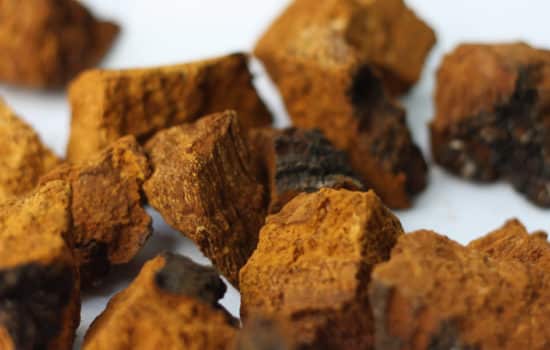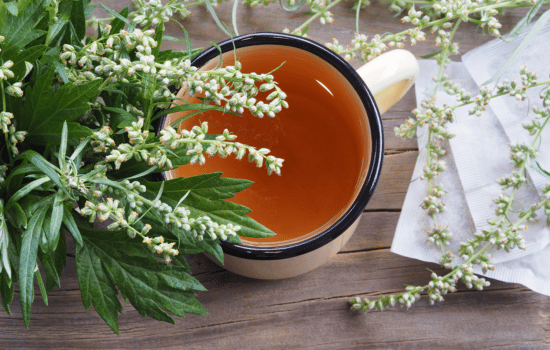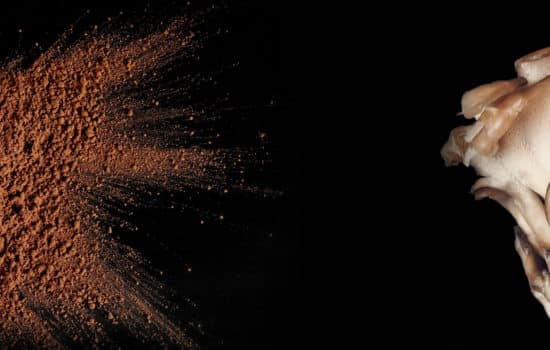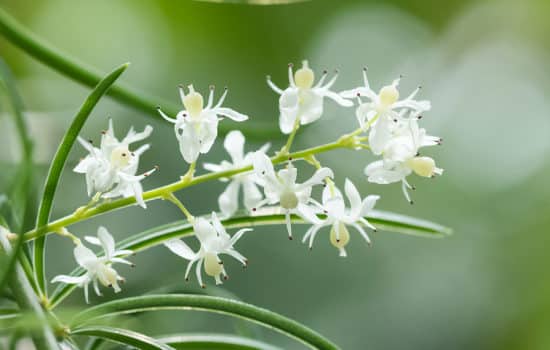If you find mugwort in your garden, you may think of it as nothing more than a pesky weed that needs to be pulled. But wait! By discarding these flowering plants with your yard waste, you may unknowingly get rid of a wide array of wellness benefits.
That’s right, hidden within this common plant that many gardeners consider a nuisance are antioxidant-rich and soothing botanical compounds that may support your wellbeing when incorporated into your routine as an herbal tea.
So, what exactly is mugwort? What are its benefits? And can you make your own mugwort tea? Let’s dig into it!
What Is Mugwort?
Mugwort is a perennial flowering plant with dark green leaves and small, puffy flowers. These plants can grow up to six feet tall.
You can identify the mugwort plant by its deeply lobed and jagged leaves and the silvery white hairs found on the underbelly of the leaves (these hairs won’t be on the top side of the leaves). The mugwort stem may be purple or red, and the flowers can range in color from red to light yellow.
Mugwort, also called common mugwort or Artemisia vulgaris l., is a member of the Asteraceae (or daisy) family and part of the genus Artemisia.
While mugwort is considered an invasive plant that can quickly overtake a yard or garden, many consider it a welcomed guest. This is because mugwort is an edible herb that can help ease feelings of stress and tension, support normal digestion, and more.
The History of Mugwort
Mugwort has played a long and varied role in human history, spanning thousands of years. Legend has it that Roman soldiers put mugwort in their sandals to ward off fatigue, wild animals, and evil spirits.
Mugwort has also been used in traditional herbal medicine to encourage vivid and lucid dreaming. According to some accounts, mugwort can even help with dream recall. People have placed mugwort underneath their pillow to elevate the dreaming experience.
Mugwort is in the Nine Herbs Charm — an old English charm written and recorded in the tenth century.
In Traditional Chinese Medicine (or TCM), mugwort is considered a warming element that has been used in moxibustion for over 3,000 years.
Moxibustion is a therapeutic practice that involves burning sticks or cones of dried and rolled mugwort during acupuncture. These sticks are burned over an acupuncture point to help release energy and enhance the effects of acupuncture treatment, which include soothing discomfort, particularly in the back, neck, and head.
Moxibustion has traditionally been used to soothe feelings of discomfort caused by menstrual cramps. And mugwort’s history doesn’t end with medicinal and therapeutic uses. This plant has also been a popular flavoring in Europe and Asia.
Before hops, mugwort was used to flavor European beer. In Germany, mugwort is traditionally used to flavor the traditional German Christmas goose. Mugwort is a flavoring in many Japanese desserts and rice cakes. You can also find mugwort as a flavoring ingredient in pancakes, salads, and soups in Korea.
Mugwort has also been used as an insect repellant. In some places, mugwort was planted around the house to deter moths.
Where Does Mugwort Grow?
While mugwort is native to Asia and Europe, mugwort can grow just about anywhere.
The Artemisia Vulgaris species of mugwort grows along streams and rivers, in open fields, on roadsides, and in gardens across the globe — most commonly in Europe, Asia, and North America. Another species of mugwort known as Artemisia Princeps predominately grows in China, Japan, and Korea.
When it comes to mugwort, once you know what to look for, you’ll likely start spotting it without needing to look too far.
Other Names for Mugwort
Gardeners and herbalists may refer to mugwort by several names, including artemisia, hierba de San Juan, armoise, Vulgaris herba, felon herb, chrysanthemum weed, herbe royale, wormwood, traveler’s herb, Artemis herb, motherwort, and bulwand.
Mugwort is known as the “dream plant,” recognizing the plant’s popularity as a way to promote vivid dreams and boost dream recall.
The name mugwort stems from the Anglo-Saxon and Old English words for “root” and “marsh,” relating to how and where these beneficial plants are.
What Does Mugwort Taste Like?
Mugwort has similar aromatics to sage and aniseed, with an earthy flavor and a hint of bitterness and sweetness. Many say that the bitterness of mugwort is an acquired taste that you strangely begin to crave over time.
The essential oils found within the mugwort plant release a pleasant, spring-like fragrance when heated that can add a little aromatherapy to your day, whether you’re brewing a cozy cup of warming mugwort tea or using the herb for seasoning meat or veggies.
You can use the aromatic fresh or dried mugwort leaves to make teas, soups, and even smoothies. You can also find this beneficial botanical in smoking blends, essential oils, and dietary supplements.
Uses for Mugwort Tea
Mugwort tea is a gentle and soothing caffeine-free tea used to support feelings of calm and soothe feelings of tension, calm a queasy stomach, and ease feelings of discomfort associated with menstruation.
Mugwort’s essential oil (the plant’s essence) includes nourishing plant compounds such as camphor, pinene, and cineole. These compounds can contain powerful antioxidant properties to support your body’s natural immune response.
Can Mugwort Help With Feelings of Stress?
Drinking a warming cup of mugwort tea after a long day or whenever you feel nervous may help calm your mind and ease your worries.
The mugwort plant contains a polyphenol, or plant compound, called chlorophyll. Chlorophyll contains antioxidant properties that can soothe feelings of discomfort throughout the brain and body and help the body’s natural response to stress overall.
The magnesium and B vitamins found within the mugwort leaves and blossoms are also known to help support a positive mood and soothe feelings of tension. Magnesium is a mineral that can help your body’s regulation of neurotransmitters, such as the calming Gamma-Aminobutyric Acid (GABA) neurotransmitter.
Meanwhile, Vitamin B1 and Vitamin B2 help support the nervous system, which plays a vital role in responding to the stress hormone cortisol. Incorporating plants like mugwort that are rich in these nutrients into your diet can help your nervous system to navigate stressors.
Should You Drink Mugwort Tea for Feelings of Physical Tension?
The same mugwort polyphenols that can help soothe feelings of mental stress may also aid in soothing feelings of physical stress held within the body.
Soothing head, neck, and back tension have been the main uses of moxibustion in TCM, and drinking mugwort tea may provide similar supportive benefits.
Many of us can attest to the discomfort of head and neck tension that can creep up on us after a long day at the computer or a night of tossing and turning.
Luckily, a pleasantly spring-smelling mug of mugwort tea can help soothe feelings of physical discomfort as the plant compounds work to naturally soothe these feelings of tension.
Can Mugwort Tea Soothe an Upset Stomach?
In European herbalism, mugwort tea is a go-to for gastrointestinal support thanks to its fiber content. The fiber in mugwort is a star player in supporting normal digestion. Fiber can help promote regularity and normal bowel movements, which can help provide relief for discomfort.
The essential oil compounds and antioxidant-rich vitamin C found in mugwort tea can also help support your natural gut flora.
And by helping to soothe feelings of stress, mugwort tea can also help soothe the feelings that stress can manifest in the gut. So the next time you feel nervous and like your stomach is in knots, take a deep breath and make yourself a soothing cup of mugwort tea to help your mind and body decompress.
Can You Make Your Own Mugwort Tea?
Making mugwort tea is a simple and enjoyable way to experience the wellness benefits mugwort has to offer.
Here’s what you’ll need to make a cup of mugwort tea at home:
- One cup of boiling water
- One and a half teaspoons of dried mugwort (the leaves and flowers are the parts of the plant most commonly used for tea)
- A steeper or strainer
Bring your water to a boil and pour over the dried mugwort. Steep for at least 10 minutes to ensure the beneficial plant compounds and flavors steep into the water before straining.
Once you’ve finished steeping, you’ll have a wonderfully warming and earthy cup of tea ready to bring you some relief.
Precautions
While making mugwort tea is safe for most people, there are a few precautions and side effects to keep in mind.
Mugwort is related to ragweed, so you shouldn’t consume mugwort if you are allergic to ragweed, as you may be at an increased risk of allergic reaction to mugwort as well.
Symptoms of a mugwort allergic reaction could include hives, itching, headaches, nausea or vomiting, irregular heartbeat, or shortness of breath. It is best to check in with a healthcare provider immediately if you experience severe allergy symptoms after drinking mugwort tea.
You should also avoid mugwort if you are allergic to celery, birch, carrot, peaches, apples, or sunflowers.
You should not drink mugwort tea if you are pregnant, as this herb can affect uterine contractions during pregnancy. The effect of mugwort tea while breastfeeding has not been well studied, so it is best to avoid it.
Mugwort may interact with drugs and supplements, so it is best to speak with a healthcare professional before using mugwort if you have certain health conditions or take other medications.
And because the FDA does not regulate herbal remedies, make sure you only purchase mugwort from reputable vendors.
If you are growing or foraging mugwort to use in mugwort tea, ensure you only harvest the plant from areas that have not been exposed to herbicides, pesticides, or other toxins. It is also best to cultivate mugwort when it is just starting to bloom.
Alternatives to Mugwort Tea
While we love a good cup of mugwort tea here at the Apothecary, we’d also never turn away other forms of wellness-enhancing adaptogenic teas. Luckily, plenty of options are available if you’re looking for other types of tea to explore.
CBD Tea
CBD teas combine a variety of botanicals with CBD, a well-loved phytocannabinoid that can help support overall wellness.
CBD teas can support your well-being in various ways. Whether supporting feelings of calm, supporting a good night’s sleep, or just contributing to feelings of balance and wellness — there is a CBD tea ready to support you each morning, afternoon, or night.
Here at The Brothers Apothecary, we craft our full-spectrum CBD teas with dried CBD leaves and a proprietary infusion process that combines organic and locally sourced ingredients like Yucca Root, Tapioca, and Coconut to support the bioavailability of the CBD.
Chaga Tea
Chaga mushroom is an adaptogenic superfood that can support the body’s natural ability to adapt to its environment and stressors.
This fungi also makes a mean cup of tea (or hot chocolate!). With polysaccharides and minerals that can support your body’s natural metabolic function, this nutty and earthy tea can provide feelings of alertness without any caffeine.
Like mugwort, Chaga contains nutrients and minerals such as beta-D-glucan, fiber, potassium, and zinc that can help soothe feelings of physical tension and support the immune system and feelings of calm.
Wrapping Up
While you may not know from simply looking at it, mugwort is much more than an invasive garden weed. This warming plant has a rich history and can help release energy and support the nervous system during acupuncture, support your mind’s ability to lucid dream, and soothe feelings of nervousness and abdominal discomfort.
You can make mugwort tea at home or find this beneficial herb in any of our Relax Smoking Blend here at the Apothecary. This small batch lucid dreaming blend infuses hemp flowers and herbs to support a sense of oneness that is ideal before sleep or meditation.
You can find our lucid dreaming blend, along with all of our beneficial botanical and hemp-based blends, teas, and more at The Brothers Apothecary shop!
Sources:
Artemisia Allergy Research in China | PMC
Jesse Richardson is the co-founder of The Brothers Apothecary. He's an avid tea drinker and the primary creator behind The Brothers' products. An undergraduate of UCLA for Political Science, Jesse currently studies Medicinal Plants at Cornell University and The International School of Herbal Arts & Sciences.



